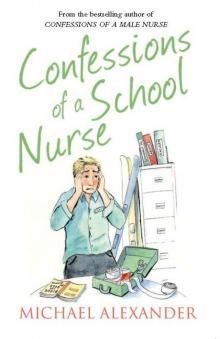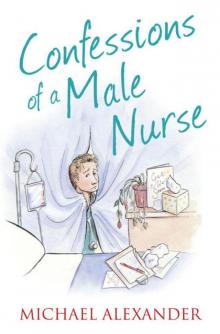- Home
- Michael Alexander
Confessions of a Male Nurse Page 11
Confessions of a Male Nurse Read online
Page 11
If I did walk out, the hospital would want to find a scapegoat. Everything was against me. First, I was new, second, I was from an agency, and third, if things ever went to court, I could never afford to support myself if I was forced to stop nursing while the case was resolved. It would probably also spell the end of my time in the UK.
Instead, I did what I always do at the start of a shift, and that was to eyeball all my patients, and make sure they were all breathing. I could have gone and read each and every patient’s medical file, but decided against it as that would take quite a bit of time.
‘Good evening,’ I said, as I stood in the doorway to room 1. There was no name on the door and she was one of the patients whose names I had missed.
‘Who’s there?’
A thin, wavering voice drifted out of the room.
‘Is that you, Jim?’
I walked into the room to see a frail, elderly woman sitting on the floor beside her armchair. She looked up as I entered.
‘You’re not Jim. Who are you?’ she asked suspiciously.
‘I’m the night nurse. You look like you could do with a hand,’ I said, as I bent to pick her up off the floor.
‘You’re not Jim. Get your hands off me. Help. Help,’ she began shouting feebly. I backed off and knelt down beside her.
‘It’s okay. I’m not Jim, but I’m here to help,’ I said in a calm, quiet voice. She sat staring at me in silence. I felt telepathic. I could almost see the turmoil in her mind; the confusion, the indecision, the fear and the desperation. She finally broke the silence.
‘Where’s Jim?’ she asked again, her voice even more uncertain than before.
‘I don’t know where Jim is. Do you know where you are?’
She looked up at the bed beside her. A full ten seconds passed before she answered.
‘I’m in hospital. You’re not Jim. Who are you?’
She sounded less afraid.
‘I’m the night nurse. We need to get you off the floor. Will you let me help you?’
As soon as I said that, she looked behind her, her hands feeling the legs of the chair supporting her.
‘Well, it’s about time. I’ve been here long enough. The service in this place is terrible. When’s dinner? Have I missed dinner? I’m going to lay a complaint. The service is terrible,’ she repeated.
I couldn’t have agreed with her more.
The unnamed woman let me help her get up off the floor. She didn’t seem to have any injuries and was able to support her own weight. I tucked her into bed.
‘You’re a good boy, Jim,’ she said to me, as I headed out of her room.
I needed to get her checked properly, she could have broken a hip, but I also had to see my other patients.
Everything was quiet, although this could be because all my patients were dead. It would have been useful to know things like who had had surgery. Or who was going to surgery. I suppose I could ask my patients what was wrong with them, but that approach doesn’t tend to instil a sense of confidence.
I entered the next room. This was the guy Beatrice had put on the floor. Mr Mason the name said on the door. I entered the room and was almost knocked over by the stench. I stifled the urge to vomit. Lying on the floor was the cause of the stench.
Mr Mason was lying on his side, on the vinyl next to his mattress; his back was to me, and he was unclothed. Where were his clothes? Why was he naked? In a way, it was just as well he was because he was covered in excrement from head to toe. There was old caked-on faeces that had to be at least several hours old. It was on his face and in his hair. There was fresh solid faeces from the neck down, oh and some loose greenish faeces came out of his back passage right then. The floor was covered in excrement. Oh shit, I was standing in it already. I didn’t want to go near him, let alone touch him.
‘Help,’ he muttered.
I tiptoed around to the other side of the room, to where he could see me. I looked at his face, but he didn’t seem to notice me. He was shaking from the cold, but I didn’t reach out to touch a limb. He probably had hepatitis C. In fact he probably had the works, hep A, B and C.
‘Help,’ he called again, still not seeming to see me standing right in front of him.
‘Mr Mason,’ I called out to him, but he didn’t respond. ‘Mr Mason,’ I said, a lot louder this time.
Mr Mason briefly glanced in my direction, but didn’t bother to reply.
Mr Mason was homeless. We’ve all seen them, even though we try not to, sitting in doorways sipping methylated spirits, sleeping on the pavement, or begging for a penny.
He couldn’t have been very old – 35 at most – but his body was emaciated and covered in sores. I could see several oozing sores on the inside of each arm where he had obviously been searching for veins to inject. His hands kept on scratching at them, sometimes drawing fresh blood. His hair was overgrown and tangled. I didn’t get too close, in case any of his head lice made the leap over to me. I’m allowed to be revolted, as I’m sure Beatrice was, but that’s no excuse for leaving any patient in such a condition. I was going to need some help.
I left the room to track down the two nurse assistants on shift with me.
They were at the other end of the ward, hanging around Anna as she was handing out patient medicines.
‘I’m going to need your help,’ I said to the two assistants.
They looked to Anna for direction.
‘They have to finish their work down this end. I’ll send them down your end in a while,’ she said.
‘We always start at this end. You’ll just have to wait a little,’ said one of the assistants, obviously emboldened by Anna’s words. I looked at the name tag, Susan.
‘I’m sorry, but that will have to wait. I need you now,’ I said.
Anna wasn’t eager to lose her two helpers.
‘Is it urgent? Can’t it wait? They really need to finish their work down here.’
Work! They were standing around chatting with Anna, while I was literally in deep shit.
‘If they don’t come with me now I will be leaving,’ I threatened.
Anna instructed Susan and her colleague, Melanie, to go with me. They fell into line, dragging their feet and moaning to each other about how overworked and under-appreciated they were.
We stood staring at Mr Mason, in silence, until I eventually broke the ice.
‘This looks like your area of expertise,’ I said to the two of them. ‘I’ll leave you to it.’
Both girls looked pale.
‘You might want to wash your shoes, Susan. You’re not standing in the safest place,’ I said.
Susan looked down at her feet and dry retched.
I never could and never would leave dirty work to someone else and besides, these young girls looked completely out of their depth. Gone was their condescending, obnoxious demeanour; all I could see were two very worried, even scared young girls. Susan was only a second year nursing student trying to make some extra money, while Melanie had started working at the hospital three months ago.
‘Susan, Melanie, get some gloves, gowns, masks, face shields, waste baskets and a big bowl of water. I’ll give you a hand.’
They were so relieved they virtually ran to do my bidding.
‘On the count of three, everyone heave. One, two, three, lift,’ I said as we tried to raise Mr Mason up into a chair. It was like trying to wrestle with an octopus, as he slipped through our fingers. What was Beatrice thinking putting his mattress on the floor? Cleaning up people like Mr Mason is pretty standard work, if you know what you’re doing, but this added complication was proving a real problem.
Mr Mason chose that moment to slip through our grasp and landed in a kneeling position with his forehead touching the floor and his butt pointing in the air.
‘Don’t move him; clean his back and butt while he’s like that,’ I told the girls as they got stuck in.
It wasn’t the most orthodox technique but it worked. Mr Mason didn’t seem to min
d; in fact, he appeared to have gone back to sleep.
Forty-five minutes later the room was spotless, with Mr Mason lying on a clean mattress, clean sheets, wearing clean pyjamas and as far as I could tell, completely shit free. The assistants’ attitude had changed dramatically. They did everything I asked instantly and without question, but I didn’t have time to enjoy their cooperation, because I still had ten other patients to visit.
As I headed home on the bus, I found that I wasn’t tired, despite the long shift. My mind wouldn’t stop going over what had happened that night. I kept on thinking about Beatrice and how the negligence of one nurse left a man lying in his own waste.
I vowed to myself to write a factual, but scathing, letter of complaint to the hospital management.
After waking from a fitful sleep that day, I was no longer so sure. The problem was not a simple one, and I even called in sick that next night, in order to think things over.
It was my word – the word of a transient agency nurse – against that of an experienced staff member, with a lifetime of nursing behind her. If I laid a complaint, they would look at not only Beatrice’s performance, but my own. They would ask why my evening drugs were given after midnight. They would inquire why I didn’t get to my other patients sooner, and ask why I didn’t call management when I didn’t receive a handover. There were so many ways it could go wrong for me, from not doing my job properly, to asking why I didn’t walk out at the start of the shift. That’s what management and lawyers are good at, looking back and picking faults, when they’ve never been confronted with such a situation themselves. They miss the whole caring part of it.
My plea of doing it for the patients, of doing it because I care, probably wouldn’t stand up in court. Although I wouldn’t have to go to court to be screwed because all I’d need was to lose my registration. That would be more than enough.
In the end, I didn’t lay my complaint. I had convinced myself I would end up second best. But a part of me still feels guilty for not. The patients deserved better than they were getting.
Tough love
James couldn’t lie flat on the bed because his body wouldn’t allow him. Instead, he sat on the edge of the bed, his shoulders hunched forward, trembling hands gripping his knees as he struggled to find the energy to keep himself upright.
‘Nothing works,’ he managed to say before pausing to get his breath. ‘Can’t you give me something stronger?’
I nodded my head.
As I listened to his chest, checked his blood pressure, pulse and oxygen levels, my mind had already come to its own conclusions. This 17-year-old boy had neglected himself, and seemed determined to continue to do so.
It was frustrating, because James was asthmatic and a heavy smoker, and he was literally guaranteeing himself a life of lung disease if he continued.
But I could also sympathise with him, because he was only 17, unkempt, in hospital alone, with no family or friends around him. I even felt a little empathy, as I remembered being a teenager and feeling like the world was against me.
I asked James what he normally takes for his asthma, and was presented with a Ventolin inhaler; the most common one around, used to treat an actual asthma attack.
‘Is this all you have?’ I asked. He just shrugged his shoulders.
‘It’s what the doctor gave me, and it doesn’t work.’ He paused for breath, but he sounded angry. ‘The doctor’s useless.’
I gave the inhaler a shake, and found it to be empty.
‘You do know there’s nothing in here?’
James scowled at my comment. ‘I’m not stupid! But it doesn’t work anyway, even when it’s full.’
He hadn’t had any Ventolin in over a week.
Instead of getting into an argument with him, I got the doctor to quickly prescribe a nebuliser. This is a mask that sits on the face, and provides oxygen, mixed with medication, that the patient can breathe directly into their lungs.
Once this was up and running, I took the opportunity to find out some more about my patient.
‘Have you been back to your family doctor, and told him it doesn’t work?’
James shook his head.
‘Why not?’
‘Why would I? His medicine doesn’t work.’
I was getting nowhere with this line of discussion, so I changed the topic.
‘Have you ever tried a preventer?’
‘Don’t know. That’s my preventer there, isn’t it?’ he said, referring to his Ventolin inhaler.
It was surprising to see that he knew nothing about his asthma, and while it was also frustrating that he didn’t seem to care, it was sad that we weren’t going to be able to make any real changes here. We’d get his breathing settled, and then probably send him home, from there it would be up to him to follow up with his family doctor.
‘Well, there are actually lots of treatments your doctor could try. And your Ventolin inhaler isn’t a preventative – all it can do is relieve the symptoms of an attack. You need to talk about what else is out there with your doctor.’
I explained how dangerous it was to smoke when you had asthma. I even went as far as to say that if he kept on smoking, he was almost guaranteed to end up with lung disease. But I could sense that these words had no effect, after all, they’re just words.
I left James alone to give him a chance to mull over what I’d told him. I informed the doctor of how things were.
‘When can I go home?’ After three hours in the emergency room receiving treatment, James was much improved. His breathing had settled completely, the wheezing in his chest had nearly gone, and he could lie back on the bed and relax. He even dozed off for an hour.
‘Where is home, James? Can we call your parents to pick you up?’ James explained that he didn’t live with his parents, but with a group of students. He didn’t want his parents to be involved.
I left him in the doctor’s capable hands.
At the end of treatment, the doctor gave the usual advice about the need to stop smoking, and the need to be more proactive in his own care. He also reiterated what I had said earlier, about the deadly combination of smoking and asthma, adding that 80 per cent of people with lung disease were smokers. He was given a new inhaler, and the contact details for an asthma support/education programme.
I was working the following Saturday evening when James presented to the emergency room again. His asthma was playing up, and he was also complaining about how useless the inhaler we had given him was. His problems were exacerbated by the fact he’d developed pneumonia. Generally a young man of James’s age would not need to be admitted to hospital for such a diagnosis – he’d be able to be at home while taking antibiotics – but James was too unwell.
‘I told you it doesn’t work, and you sent me away.’ Even though James’s anger seemed directed at me, it was really directed at everyone.
‘Listen, mate, let’s play the blame game later. Right now, we just want to get you better. And you’ll have plenty of time to get yourself sorted out, because you’re going to be admitted.’
James lifted his head off his chest. ‘I’m not staying in this shithole, no way. Just give me some proper medicine, something stronger, like you did last time.’
I tried the honest approach. ‘People die from asthma – young people like you. If you have a death wish, you’re free to go, right now. We won’t stop you.’ Amid much moaning and fuss, James let himself be admitted to a medical ward.
When I transferred James to the medical ward, I was pleasantly surprised to see that it was Gwen who was going to take over James’s care. She had been a nurse in the NHS for 25 years, and in the process had managed to raise three teenage sons and one daughter. If anyone could get through to James, it was her. Gwen wasn’t one to just do her job, and give out medicines and advice that would most likely be ignored. She did whatever it took to make a change.
James would be sharing a room with three elderly men; two heart attacks and a stroke (no offence in
tended, but it’s not unusual to identify patients by their illnesses). It was James’s first time sharing a room, as well as his first time staying in a hospital overnight.
The effect of being in a hospital ward, seeing, hearing, smelling and feeling what it’s like, is sometimes enough to bring about a change for the better. It’s often a wake-up call. Unfortunately, it seemed to have no impact on James.
After two days of intravenous antibiotics, James hadn’t improved. Gwen put it down to the fact that he spent most of his time outside the front door of the hospital, in the cold, smoking. He’d have a cigarette or three, and then wander back to the ward for his next antibiotics or nebuliser. Something had to be done.
Gwen went to James’s room and began packing up his things. ‘What’s going on? Am I being moved?’
Gwen nodded her head, and kept on packing.
‘Where am I going?’
‘Home, of course.’
James sat stunned. He began to protest, but Gwen cut him off again.
‘What’re you moaning for, boy? You kicked up a fuss about coming here. I would’ve thought you couldn’t wait to get out of this place. Or don’t you want to get out?’
James was caught off guard by Gwen’s attack. ‘Ah… yeah… yeah, I want to get out.’
‘Well, at the rate you’re going, the only way out of here is in a box. What don’t you understand? You’re killing yourself. I hope it’s quick, for your sake.’
James rallied. ‘You can’t talk to me like that.’
‘Why, does it upset you? Does the truth hurt? Why do you think I’m talking to you like this? Why?’
James was speechless.
‘Because we might care, but we can only do so much. You have to start helping yourself. I want to help, but I’ve got other patients who need my help, and are willing to listen. Are you going to start listening to me from now on?’
James nodded his head. ‘I’m sorry,’ he finally stammered.
James didn’t change overnight.

 Woken
Woken_preview.jpg) Minecraft: Battle of Legends Book 1 (An Unofficial Minecraft Book)
Minecraft: Battle of Legends Book 1 (An Unofficial Minecraft Book) Diary of a Minecraft Agent
Diary of a Minecraft Agent Confessions of a School Nurse
Confessions of a School Nurse Confessions of a Male Nurse
Confessions of a Male Nurse